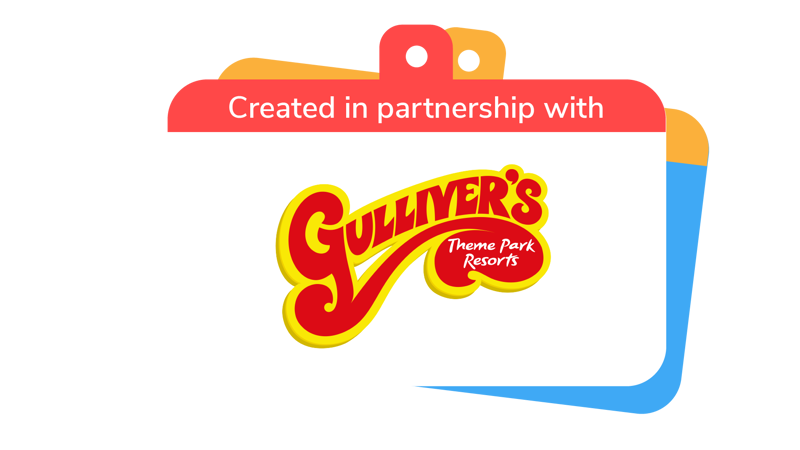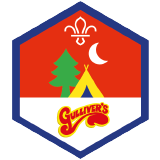
Campfire crisp
You’ll need
- Wooden spoons
- Chopping boards
- Bowls
- Ingredients (see recipe)
Try this at Gulliver's Theme Park Resorts!
Thinking of running this activity? Well, why not try it during a trip to Gulliver's Theme Park Resorts with your group. Whether you are there for a Scouts Takeover weekend, or heading out on a group visit with just your troop, this activity can be a great addition to your trip programming.
Learn more about the partnership hereBefore you begin
- Find a suitable place for your fire, for example, a local campsite or outdoor space around your meeting place. Remember to get the landowner’s permission if needed.
- Complete a risk assessment, and read (or reread) the 'Safe and hygienic cooking' guidance below.
- Check in advance whether anyone has allergies or dietary requirements so you can buy substitute ingredients.
- You will need helpers to assist the groups, but encourage young people to take charge of some tasks.
Store food
- Always keep raw food separate from cooked food.
- Keep frozen food frozen, and don’t refreeze it if it defrosts. Keep food in the fridge or freezer until you need to take it out to cook it – don’t leave it out on the side.
- Keep food covered.
Get ready to cook
- If you’re unwell, tell an adult – you might not be able to cook if you could make others poorly.
- If you have long hair, tie your hair up.
- Take off any jewellery – especially rings (a plain gold ring is OK).
- Wash your hands properly. Cover any cuts, spots, or boils with a waterproof plaster or dressing – if you can, use brightly coloured plasters.
- Check all your equipment – is it clean, and free from damage?
- Clean your work surfaces – use an antibacterial spray.
Time to cook
- Wash fruit and vegetables before you prepare them.
- Wash your hands after handling raw meat, fish, or eggs. Wash your hands again if you sneeze, cough, eat anything, touch your hair, use the toilet, or touch rubbish.
- Always carry knives pointing towards the floor, and cut or chop on a chopping board – never in your hand.
- Use tongs or other equipment to touch food – avoid using your hands if you can.
- Remember that you still need to keep raw food separate from cooked food, including using different utensils like chopping boards and knives (if you can’t, always wash and sterilise them).
- Make sure food gets hot enough – it should be at least 70°C for two minutes.
- Don’t leave metal spoons in hot liquids, and don’t leave pan handles over a hot hob.
- Clean up any spills immediately.
Grub’s up
- Don’t leave leftovers to cool on the side – if you’re going to eat them later, they need to be cooled and put in the fridge as soon as possible.
- Clean the surfaces you’ll eat from – use an antibacterial spray.
- Wash your hands before you eat.
Tidy up
- Use hot water (and detergent) when washing up. Ideally, use a second bowl with hot water to rinse.
- Never use a tea towel that’s fallen on the floor.
Cook campfire crisp
- Everyone should get involved in building and lighting a fire, or separate into smaller groups and build multiple smaller fires, one for each group. If there’s not enough time to light the fire and let it die down to embers, the person leading the activity could build the fires before everyone else arrives.
- Everyone should wash their hands.
- The group should separate into small groups if they haven’t already – each will work together to make the apple crisp.
- Everyone should remember essential safety and hygiene tips, checking everyone has washed their hands and that their area and equipment are clean.
- Each group should have copy of the recipe card and all their ingredients.
- Following their recipe card, everyone should prepare their crumble.
- Once they’ve finished eating, groups should clean, wash up, and put away all their equipment and ingredients.
- The person leading the activity should make sure the fires are safely extinguished and everyone should make sure they leave no trace outdoors.
Reflection
This activity helped the group value the outdoors and experience the differences between cooking inside in a kitchen and outside, using a fire. Did they enjoy cooking and eating outside? Did it have any extra challenges? Everyone should think about any changes they’d make to the recipe next time, such as adding different fruits, using smaller or larger chunks of apple, or eating it with custard or ice cream. Part of the fun of campfire cooking is eating outdoors, the group should stop and think about the unique sights, sounds and smells.
Everyone had to be a team player, so they should consider how well they worked with other people to make the campfire crisp. Were the tasks divided up or did they try every step of the recipe? How did they make sure everyone got involved? Did one person in each group lead or several people?
Safety
All activities must be safely managed. You must complete a thorough risk assessment and take appropriate steps to reduce risk. Use the safety checklist to help you plan and risk assess your activity. Always get approval for the activity, and have suitable supervision and an InTouch process.
- Fires and stoves
Make sure anyone using fires and stoves is doing so safely. Check that the equipment and area are suitable and have plenty of ventilation. Follow the gas safety guidance. Have a safe way to extinguish the fire in an emergency.
- Food
Remember to check for allergies, eating problems, fasting or dietary requirements and adjust the recipe as needed. Make sure you’ve suitable areas for storing and preparing food and avoid cross contamination of different foods. Take a look at our guidance on food safety and hygiene.
- Cooking
Teach young people how to use cooking equipment safely. Supervise them appropriately throughout. Make sure it’s safe to use and follow manufacturers’ guidelines for use.
- Sharp objects
Teach young people how to use sharp objects safely. Supervise them appropriately throughout. Store all sharp objects securely, out of the reach of young people.
- Outdoor activities
You must have permission to use the location. Always check the weather forecast, and inform parents and carers of any change in venue.
If you’re short on time, measure out the ingredients beforehand.
Support with chopping and mixing but encourage everyone to try the different steps.
All Scout activities should be inclusive and accessible.
If you enjoyed this, try other backwoods cooking recipes. Make two more dishes – one sweet, and one savoury – to meet the fourth requirement of your Cook Activity Badge.


